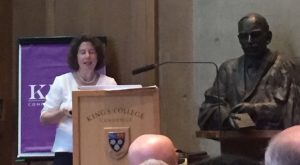Robert Jones became Chancellor of the University of Illinois at Urbana-Champaign at the end of September. We owe gratitude to the Interim Chancellor before him, Barbara Wilson, who led our campus well through some challenging times. It is good, though, now to have stable leadership at the top. I am personally very excited about the directions in which we might go with his voice in our conversations. He is an outstanding scientist. He cares deeply about students (his comments at the first Faculty Senate meeting he attended were effusive tales of the students and alumni with whom he had met in his first weeks.) And he is the son of a sharecropper, bringing a new perspective and urgency to our discussion and efforts surrounding issues of diversity.
I’ll let Dr. Jones own words speak for him (these are excerpts from an October 3 email he sent to campus after two weeks on the job):
“It has everything to do with one day in a field in southwest Georgia when I was 9 years old. I was supposed to be picking cotton. Instead, I was distracted thinking how in the world this green plant could create this fluffy white ball. That was the day I started on the path to becoming an agronomist. … We need to find ways to make that story possible for everyone – no matter where they start, what their parents do … when questions around social equity and social justice are forcing fundamental reevaluations of everything from our admission policies to our investment strategies, we have an opportunity to demonstrate different paths forward.”
Yes, Dr. Jones. Yes, we do.


